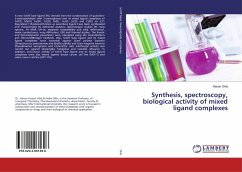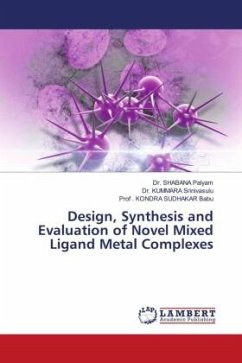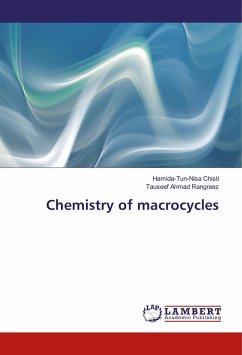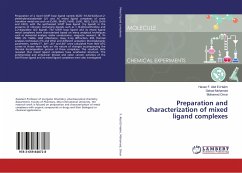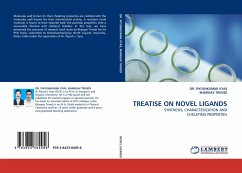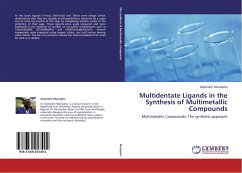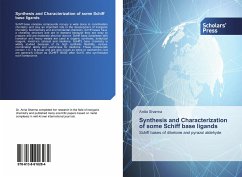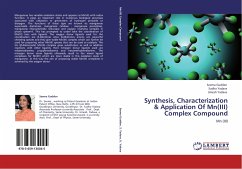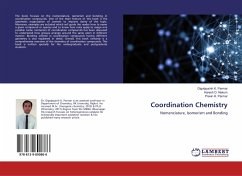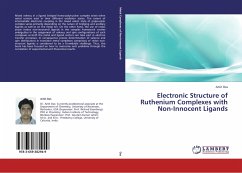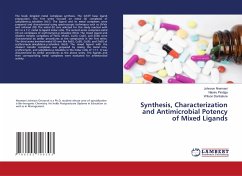
Synthesis, Characterization and Antimicrobial Potency of Mixed Ligands
Versandkostenfrei!
Versandfertig in 6-10 Tagen
27,99 €
inkl. MwSt.

PAYBACK Punkte
14 °P sammeln!
The book detailed metal complexes synthesis, The Schiff base ligand preparation. The first series focused on metal (II) complexes of salicylidene.p.toluidine (HL1). The ligand and its metal complexes were prepared and characterized using spectroscopic techniques such as UV-Vis and infrared (IR). The metal (II) ions selected for this study reacted with HL1 in a 1:2, metal to ligand molar ratio. The second series comprises metal (II) ion complexes of erythromycin.p.toluidine (HL3). The mixed ligand and divalent metallic complexes of Fe(II), Mn(II), Cu(II), Co(II), and Zn(II) were characterized b...
The book detailed metal complexes synthesis, The Schiff base ligand preparation. The first series focused on metal (II) complexes of salicylidene.p.toluidine (HL1). The ligand and its metal complexes were prepared and characterized using spectroscopic techniques such as UV-Vis and infrared (IR). The metal (II) ions selected for this study reacted with HL1 in a 1:2, metal to ligand molar ratio. The second series comprises metal (II) ion complexes of erythromycin.p.toluidine (HL3). The mixed ligand and divalent metallic complexes of Fe(II), Mn(II), Cu(II), Co(II), and Zn(II) were characterized by similar procedures as the compounds in the first series. The third series involved metal (II) ions like Fe(II), Cu(II), Co(II), and Zn(II) of erythromycin.salicylidene.p.toluidine (HL4). The mixed ligand with the divalent metallic complexes was prepared by mixing the metal ions, erythromycin, and salicylidene.p.toluidine in the molar ratio of 1:1:1. It was characterized by similar procedures as the above series. The ligands and their corresponding metal complexes were evaluated for antimicrobial activity.
The book detailed metal complexes synthesis, The Schiff base ligand preparation. The first series focused on metal (II) complexes of salicylidene.p.toluidine (HL1). The ligand and its metal complexes were prepared and characterized using spectroscopic techniques such as UV-Vis and infrared (IR). The metal (II) ions selected for this study reacted with HL1 in a 1:2, metal to ligand molar ratio. The second series comprises metal (II) ion complexes of erythromycin.p.toluidine (HL3). The mixed ligand and divalent metallic complexes of Fe(II), Mn(II), Cu(II), Co(II), and Zn(II) were characterized by similar procedures as the compounds in the first series. The third series involved metal (II) ions like Fe(II), Cu(II), Co(II), and Zn(II) of erythromycin.salicylidene.p.toluidine (HL4). The mixed ligand with the divalent metallic complexes was prepared by mixing the metal ions, erythromycin, and salicylidene.p.toluidine in the molar ratio of 1:1:1. It was characterized by similar procedures as the above series. The ligands and their corresponding metal complexes were evaluated for antimicrobial activity.
The book detailed metal complexes synthesis, The Schiff base ligand preparation. The first series focused on metal (II) complexes of salicylidene.p.toluidine (HL1). The ligand and its metal complexes were prepared and characterized using spectroscopic techniques such as UV-Vis and infrared (IR). The metal (II) ions selected for this study reacted with HL1 in a 1:2, metal to ligand molar ratio. The second series comprises metal (II) ion complexes of erythromycin.p.toluidine (HL3). The mixed ligand and divalent metallic complexes of Fe(II), Mn(II), Cu(II), Co(II), and Zn(II) were characterized by similar procedures as the compounds in the first series. The third series involved metal (II) ions like Fe(II), Cu(II), Co(II), and Zn(II) of erythromycin.salicylidene.p.toluidine (HL4). The mixed ligand with the divalent metallic complexes was prepared by mixing the metal ions, erythromycin, and salicylidene.p.toluidine in the molar ratio of 1:1:1. It was characterized by similar procedures as the above series. The ligands and their corresponding metal complexes were evaluated for antimicrobial activity.



